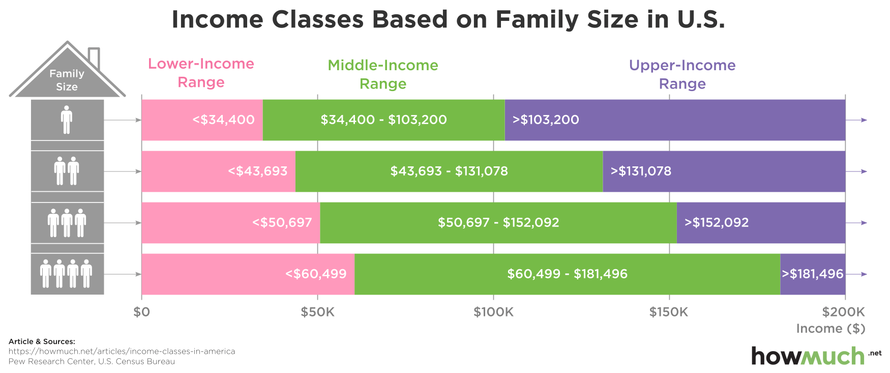Are you in the middle class?
You probably think you are, according to new research from the Pew Research Center, but that doesn’t necessarily mean you’re right. As HowMuch.net explains, it turns out household size is a major determiner of status in the lower, middle and upper classes.
We plotted family size against the income range required to be in the lower, middle and upper classes, letting you easily see how much money people need to make to be at opposite ends of the income spectrum. And in fact, the size of your family is directly correlated with how much you need to earn to stay afloat.
Things are relatively simple for single working adults with no children. Anyone earning under $34,400 is considered in the lower income range, and anyone making over $103,200 is in the upper class. In reality, much of this depends on where you live and how much debt you’re paying off. Does the college grad who makes six figures but lives in a big city with $100,000 of student loan debt feel like he or she is in the upper class? What about the single adult making $90,000 in West Virginia, where the cost of living is cheap? Doesn’t that qualify as an “upper income”? It all depends on the cost of living for where you live in particular.
Regardless, our visualization demonstrates that adding more people to your household increases the amount you need to earn to enjoy the same standard of living. Having a child or getting married raises the bar to middle class entry to $43,693. For a household of 3 people, it goes higher to $50,697. And for two breadwinners and a pair of kids, the level goes even further up to $60,499. In other words, having a second child means you need to earn about $10,000 more just to stay at the same level, much less climb higher.
The same thing happens at the opposite end of the income spectrum. The gap between middle- and upper-income households grows the more people join a household. A single adult at the low end of the upper-income range making $103,200 would need to make $131,078 as a household of 2 people to stay at the same level. The amount jumps another $21,000 to $152,092 for households of 3, and an eye-popping $181,496 for a family of 4. That means it’s harder for well-off people to provide the same standard of living the more children they have, because, well, it’s so expensive.
All of which goes to show the dangers of “keeping up with the Joneses.” If you’re in the upper-income range and you and your spouse decide to have a second child, you don’t have to go out and earn another $29,000 just to stay in the same income range. It’s perfectly fine to slip into the middle class.
There’s a lot more we could say about how the cost of living depends entirely on where you live. Learn more by exploring our interactive calculator.
Data: Table 1.1
via RSS http://bit.ly/2FhVnyB Tyler Durden
